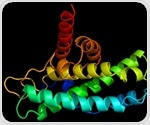|
| | January 23, 2018 | |
| | |
| | The latest breast cancer news from News Medical | |
|
|
|
 |
| | | |  U.S. FDA approves first drug for patients with germline BRCA-mutated metastatic breast cancer U.S. FDA approves first drug for patients with germline BRCA-mutated metastatic breast cancer AstraZeneca and Merck, known as MSD outside the United States and Canada, today announced that the U.S. Food and Drug Administration has approved LYNPARZA (olaparib) for use in patients with deleterious or suspected deleterious germline BRCA-mutated (gBRCAm), human epidermal growth factor receptor 2 (HER2)-negative metastatic breast cancer who have been previously treated with chemotherapy in the neoadjuvant, adjuvant or metastatic setting. | |
 |
| | | |  Exercise could extend the life expectancy of breast cancer survivors, study states Exercise could extend the life expectancy of breast cancer survivors, study states New research conducted by a group of scientists at the University of Southern California (USC), whose findings are published in the Journal of Clinical Oncology, suggests that regular exercise could extend the life expectancy of breast cancer survivors, by lowering their increased risk of type 2 diabetes, heart disease, and potentially breast cancer recurrence. | |
 |
| | | |  Exposure to estrogen-mimicking compounds may reverse effects of breast cancer treatment Exposure to estrogen-mimicking compounds may reverse effects of breast cancer treatment Scientists from The Scripps Research Institute have discovered that two estrogen-mimicking compounds found in many foods appear to potently reverse the effects of palbociclib/letrozole, a popular drug combination for treating breast cancer. | |
|
|
|
 |
| |  Aggressive cancers like glioblastoma and metastatic breast cancer have in common a siren call that beckons the bone marrow to send along whatever the tumors need to survive and thrive. Aggressive cancers like glioblastoma and metastatic breast cancer have in common a siren call that beckons the bone marrow to send along whatever the tumors need to survive and thrive. | |
|
| |  The time needed for breast cancer metastases (secondary lesions caused by cells that have escaped from the original tumor) to develop varies between patients, and little is known about the mechanisms that govern latency (the dormant state of cells that have already spread through the body). The time needed for breast cancer metastases (secondary lesions caused by cells that have escaped from the original tumor) to develop varies between patients, and little is known about the mechanisms that govern latency (the dormant state of cells that have already spread through the body). | |
|
| |  An international team of researchers led from Karolinska Institutet and Science for Life Laboratory in Sweden have found a new way of halting the growth of breast cancer cells. An international team of researchers led from Karolinska Institutet and Science for Life Laboratory in Sweden have found a new way of halting the growth of breast cancer cells. | |
|
| |  Screening the entire population for breast and ovarian cancer gene mutations, as opposed to just those at high-risk of carrying this mutation, is cost effective and could prevent more ovarian and breast cancers than the current clinical approach, according to research published today in the Journal of the National Cancer Institute. Screening the entire population for breast and ovarian cancer gene mutations, as opposed to just those at high-risk of carrying this mutation, is cost effective and could prevent more ovarian and breast cancers than the current clinical approach, according to research published today in the Journal of the National Cancer Institute. | |
|
| |  A new study published yesterday in the Journal of the National Cancer Institute suggests that, in comparison with just screening women who are at high risk of carrying breast and ovarian cancer gene mutations, screening the entire population for these mutations will be more cost-effective. A new study published yesterday in the Journal of the National Cancer Institute suggests that, in comparison with just screening women who are at high risk of carrying breast and ovarian cancer gene mutations, screening the entire population for these mutations will be more cost-effective. | |
|
|
|
|

































.png)











No hay comentarios:
Publicar un comentario